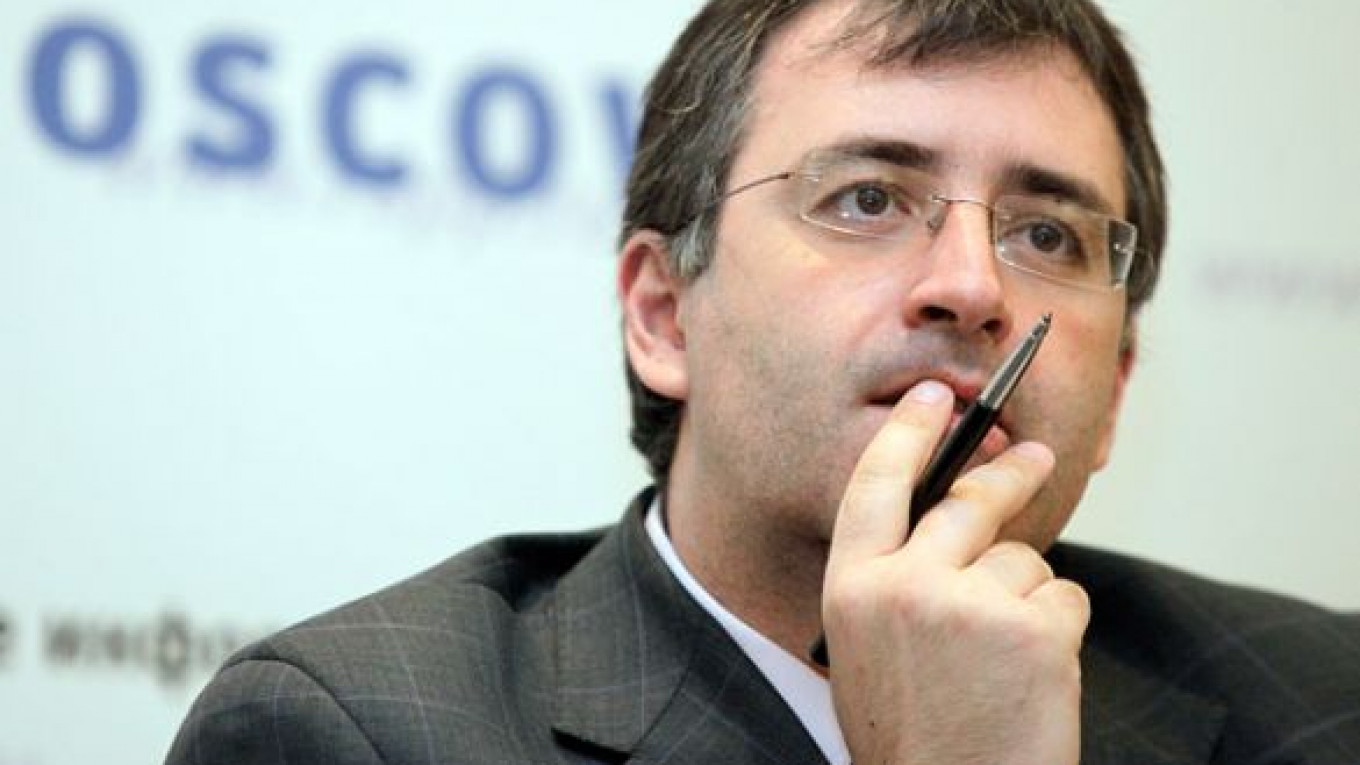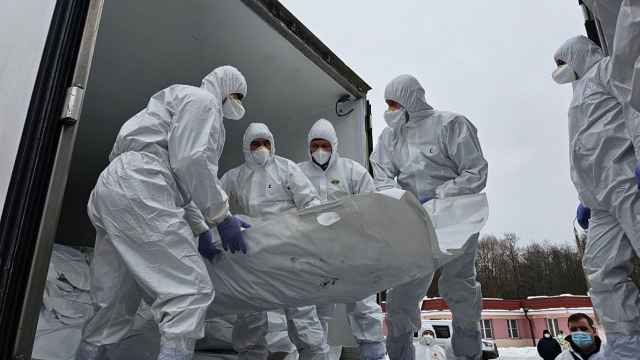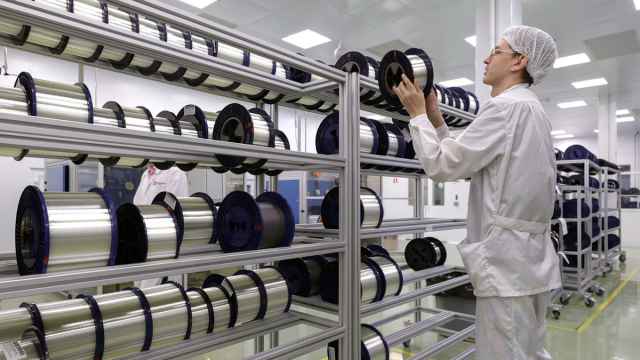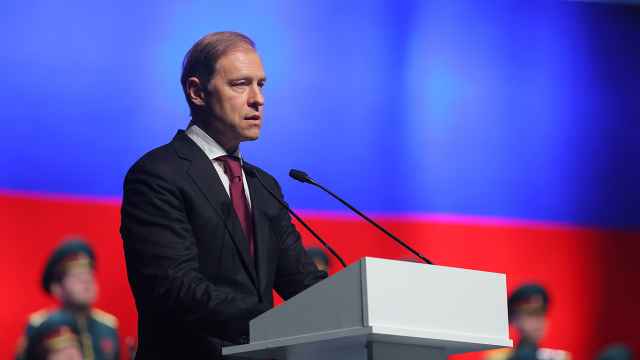The Russian stock market reacted pessimistically Thursday following the ruling of a regional court that sentenced opposition leader Alexei Navalny to five years in prison for embezzlement.
The sentence is widely believed to be another blow to Russia's image and is likely to result in an a more dramatic capital outflow from the country, as the outcome of the process might again provoke ongoing street protests, observers said.
The benchmark MICEX index slid by almost 1 percent to 1426.86 points just 10 minutes after the judge at the Kirov court, Sergei Blinov, announced the decision. The market closed at 1416.63 Thursday, down by 1.1 percent from the previous close, its biggest drop in almost a month.
Given the day's upward trend on the European financial markets, the plunge in Russia was linked to the conviction of the anti-corruption blogger, said Pavel Dorodnikov, head of equity at Moscow-based brokerage Rye, Man and Gor Securities.
"The court's ruling definitely affected investors' confidence. Their first reaction was negative," he said.
The ruling is likely to have a negative effect on Russia's investment climate, since it is follows other high-profile issues like Rosneft's purchase of TNK-BP, Dorodnikov said. He referred to statements made by the state-run oil giant earlier this year that it had no obligations to TNK-BP's minority shareholders after closing the deal.
While Russia aims to make it to the 20th place on the World Bank's Doing Business list by 2018, up from number 120 last year, foreign investors and experts have repeatedly listed poor rule of law among the key problems the country needs to resolve to attract capital.
However, foreign investors are fleeing the country's financial market, with many of them having withdrawn funds since late February, Dorodnikov said. "Cheap equities are no longer sufficient to attract investors," he added.
The country saw a net capital outflow of over $38 billion in the first six months of this year, following the $54 billion flight last year, according to the Central Bank's figures.
The outcome of Navalny's trial is likely to "hurt Russia's ability to attract capital" in the long-term, said Jochen Wermuth, the founder and chief investment officer at Wermuth Asset Management.
"The perception of a lack of rule of law causes a high degree of uncertainty and vast discounts to the valuations of Russian assets and consequently the wealth of the Russian people," he said in e-mailed comments.
Wermuth cited the recent estimates by his firm, according to which measures to improve the rule of law — like accepting European legal precepts and acknowledging the authority of the European Court of Justice in Luxemburg — could increase the country's net present value of GDP by $31 trillion, or $218,000 per person.
Among possible effects of those steps are increasing the value of Russian assets in various industries, as well as reducing the capital raising costs, since the return on investment domestic companies currently offer to attract investors is above 22 percent, Wermuth wrote in Vedomosti earlier this month.
Some observers warned that sending Navalny to prison would kill entrepreneurial initiative in the country.
With this sentence "an entire page in the history of Russian entrepreneurship was … closed," head of Civil Platform party and Onexim Group owner Mikhail Prokhorov said. "From now on every person signing a business contract will know for sure that he might be imprisoned for that, at the behest of someone else," he said on his Facebook page after the sentence was announced.
Prokhorov said that the conviction would affect small and medium-sized business. "I wonder, how many talented young businessmen and lawyers are packing their suitcases in their minds," he said, adding that [presiding] Judge Blinov was "the only person in our county who didn't see the political element in the case of Navalny and Ofitserov."
Former rector of the New Economic School Sergei Guriev, who had fled to France in May under pressure from investigators in connection with the now defunct oil giant Yukos, called the sentence "innately unjust."
Navalny and his business partner Pyotr Ofitserov were convicted of embezzling 16 million rubles ($480,000) worth of timber from Kirov-based company KirovLes. Many observers expected that he would be given a suspended sentence.
"Alexei knew for sure that it would be a real term and that it would be long," Navalny's wife Yulia said after sentencing. "Sergei Guriev warned him about that before leaving," she added.
Officials pointed out that Navalny is not eligible for the economic amnesty introduced by a new bill that went into effect earlier this month, since the article he was convicted under is not included in the legislation.
Contact the author at [email protected]
A Message from The Moscow Times:
Dear readers,
We are facing unprecedented challenges. Russia's Prosecutor General's Office has designated The Moscow Times as an "undesirable" organization, criminalizing our work and putting our staff at risk of prosecution. This follows our earlier unjust labeling as a "foreign agent."
These actions are direct attempts to silence independent journalism in Russia. The authorities claim our work "discredits the decisions of the Russian leadership." We see things differently: we strive to provide accurate, unbiased reporting on Russia.
We, the journalists of The Moscow Times, refuse to be silenced. But to continue our work, we need your help.
Your support, no matter how small, makes a world of difference. If you can, please support us monthly starting from just $2. It's quick to set up, and every contribution makes a significant impact.
By supporting The Moscow Times, you're defending open, independent journalism in the face of repression. Thank you for standing with us.
Remind me later.






